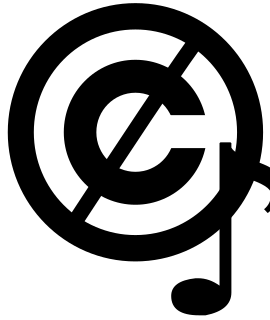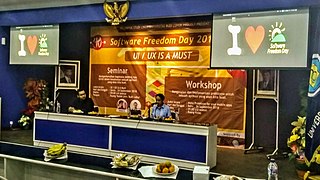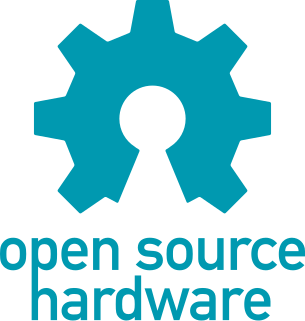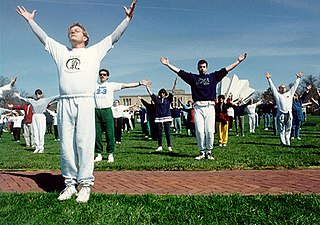The free software movement is a social movement with the goal of obtaining and guaranteeing certain freedoms for software users, namely the freedoms to run the software, to study the software, to modify the software, and to share copies of the software. Software which meets these requirements is termed free software.
Creative Commons (CC) is an American non-profit organization and international network devoted to educational access and expanding the range of creative works available for others to build upon legally and to share. The organization has released several copyright licenses, known as Creative Commons licenses, free of charge to the public. These licenses allow authors of creative works to communicate which rights they reserve and which rights they waive for the benefit of recipients or other creators. An easy-to-understand one-page explanation of rights, with associated visual symbols, explains the specifics of each Creative Commons license. Content owners still maintain their copyright, but Creative Commons licenses give standard releases that replace the individual negotiations for specific rights between copyright owner (licensor) and licensee, that are necessary under an "all rights reserved" copyright management.

Juneteenth is a federal holiday in the United States commemorating the emancipation of African-American slaves. It is also often observed for celebrating African-American culture. Originating in Galveston, Texas, it has been celebrated annually on June 19 in various parts of the United States since 1865. The day was recognized as a federal holiday on June 17, 2021, when President Joe Biden signed the Juneteenth National Independence Day Act into law. Juneteenth's commemoration is on the anniversary date of the June 19, 1865, announcement of General Order No. 3 by Union Army general Gordon Granger, proclaiming freedom for slaves in Texas, which was the last state of the Confederacy with institutional slavery.

Free music or libre music is music that, like free software, can freely be copied, distributed and modified for any purpose. Thus free music is either in the public domain or licensed under a free license by the artist or copyright holder themselves, often as a method of promotion. It does not mean that there should be no fee involved. The word free refers to freedom, not to price.

A Creative Commons (CC) license is one of several public copyright licenses that enable the free distribution of an otherwise copyrighted "work". A CC license is used when an author wants to give other people the right to share, use, and build upon a work that the author has created. CC provides an author flexibility and protects the people who use or redistribute an author's work from concerns of copyright infringement as long as they abide by the conditions that are specified in the license by which the author distributes the work.

World Car Free Day, which is celebrated on September 22, encourages motorists to give up their cars for a day. Organized events are held in some cities and countries.

Software Freedom Day (SFD) is an annual worldwide celebration of Free Software organized by the Digital Freedom Foundation (DFF). SFD is a public education effort with the aim of increasing awareness of Free Software and its virtues, and encouraging its use.

Open-source hardware (OSH) consists of physical artifacts of technology designed and offered by the open-design movement. Both free and open-source software (FOSS) and open-source hardware are created by this open-source culture movement and apply a like concept to a variety of components. It is sometimes, thus, referred to as FOSH. The term usually means that information about the hardware is easily discerned so that others can make it – coupling it closely to the maker movement. Hardware design, in addition to the software that drives the hardware, are all released under free/libre terms. The original sharer gains feedback and potentially improvements on the design from the FOSH community. There is now significant evidence that such sharing can drive a high return on investment for the scientific community.

Free and open-source software (FOSS) is software that is both free software and open-source software where anyone is freely licensed to use, copy, study, and change the software in any way, and the source code is openly shared so that people are encouraged to voluntarily improve the design of the software. This is in contrast to proprietary software, where the software is under restrictive copyright licensing and the source code is usually hidden from the users.

The free-culture movement is a social movement that promotes the freedom to distribute and modify the creative works of others in the form of free content or open content without compensation to, or the consent of, the work's original creators, by using the Internet and other forms of media.

World Tai Chi and Qigong Day (WTCQD), also spelled World T'ai Chi and Ch'i Kung Day, is an annual event held the last Saturday of April each year to promote the related disciplines of T'ai chi ch'uan and Qigong in nearly eighty countries since 1999.

Public Domain Day is an observance of when copyrights expire and works enter into the public domain. This legal transition of copyright works into the public domain usually happens every year on January 1 based on the individual copyright laws of each country.
OurProject.org (OP) is a web-based collaborative free content repository. It acts as a central location for the construction and maintenance of social/cultural/artistic projects, providing web space and tools, and focusing in free knowledge. It claims to extend the ideas and methodology of free software to social areas and free culture in general. Since September 2009, Ourproject is under the Comunes Association umbrella, and gave birth to the Kune collaborative social network for groups.

Copyleft is the practice of granting the right to freely distribute and modify intellectual property with the requirement that the same rights be preserved in derivative works created from that property. Copyleft in the form of licenses can be used to maintain copyright conditions for works ranging from computer software, to documents, art, scientific discoveries and even certain patents. Copyleft is an arrangement whereby software or artistic work may be used, modified, and distributed freely on condition that anything derived from it is bound by the same conditions.
The Free Knowledge Institute (FKI) is a non-profit organisation founded in 2006 in the Netherlands. Inspired by the free software movement, the FKI fosters the free exchange of knowledge in all areas of society by promoting freedom of use, modification, copying, and distribution of knowledge pertaining to education, technology, culture, and science.
Gleducar is a free educational project emerged in Argentina in 2002. It is also an important NGO from Argentina in the field of education and technology.

The Pirate Party Turkey is a political organization in Turkey based on the model of the Swedish Pirate Party. It was firstly founded by Serdar Kuzuloğlu and İsmail Hakkı Polat in August 26, 2009. After getting dissolved in 2010 due to infighting and disagreements, it got refound in 2013 by Serhat Koç, Barış Büyükakyol and Şevket Uyanık. The organization is inactive since 2015 and a reorganization attempt in 2017 got unsuccessful. The organization got a third refoundation in January 21, 2021, which is still in process of reorganizing the old supporters while trying to appeal to the new generation.
The digital commons are a form of commons involving the distribution and communal ownership of informational resources and technology. Resources are typically designed to be used by the community by which they are created.
Open source is source code that is made freely available for possible modification and redistribution. Products include permission to use the source code, design documents, or content of the product. The open-source model is a decentralized software development model that encourages open collaboration. A main principle of open-source software development is peer production, with products such as source code, blueprints, and documentation freely available to the public. The open-source movement in software began as a response to the limitations of proprietary code. The model is used for projects such as in open-source appropriate technology, and open-source drug discovery.

International Day Against DRM (IDAD), sometimes called just Day Against DRM or anti-DRM day, is a grassroots international observance of protests against digital rights management (DRM) technology. The event is intended as "a counterpoint to the pro-DRM message broadcast by powerful media and software companies" and aims to draw attention to DRM's anti-consumer aspects.













